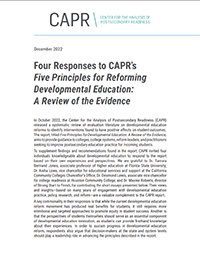Five Principles for Reforming Developmental Education: A Review of the Evidence

 In response to evidence that multi-semester prerequisite developmental education hinders academic progress for many college students, policymakers, educators, and administrators in community colleges and other broad-access postsecondary institutions have focused over the past decade on reforming developmental education practices, including how students are assessed as needing additional academic support. Researchers have studied interventions that colleges have undertaken to determine which reforms improve outcomes of students traditionally referred to developmental education.
In response to evidence that multi-semester prerequisite developmental education hinders academic progress for many college students, policymakers, educators, and administrators in community colleges and other broad-access postsecondary institutions have focused over the past decade on reforming developmental education practices, including how students are assessed as needing additional academic support. Researchers have studied interventions that colleges have undertaken to determine which reforms improve outcomes of students traditionally referred to developmental education.
In this report from the Center for the Analysis of Postsecondary Readiness (a joint project of the Community College Research Center and MDRC), the authors review both impact and implementation studies published between 2010 and 2022 to summarize what is known about how innovations to developmental education can improve student outcomes. Relying primarily on 17 studies that meet rigorous research standards, they outline five principles that are key for colleges that want to engage in developmental education reform:
- Grant students access to college-level math and English courses.
- Provide targeted and tiered supports to address students’ academic and nonacademic needs.
- Employ contextualized curriculum and student-centered pedagogy.
- Use equity-minded approaches for design and implementation.
- Implement developmental education reforms alongside comprehensive, sustained supports to improve long-term outcomes.
The authors consider how well developmental education reforms are working for students traditionally underserved in higher education, including students who are Black, Latinx, and from low-income backgrounds, as well as students with greater academic needs. They also identify areas in which stronger evidence is needed for guiding reform efforts. They argue that future research should aim to uncover specific policies and practices in institutions and classrooms that serve as barriers to racially minoritized students, and they note that more knowledge is required on how to support students with greater academic and nonacademic needs. They also discuss the costs of various reforms and note that more cost-effectiveness research is needed on interventions and strategies, such as corequisite support courses and granting students direct access to college-level courses without support.
Four Responses to CAPR’s Five Principles for Reforming Developmental Education: A Review of the Evidence
Four higher education experts write essays in response to a report from the Center for the Analysis of Postsecondary Readiness that reviews studies of developmental (or remedial) education reforms from the past 10 years. They offer their perspectives on developing equity-minded strategies to sustain and expand evidence-based practices.







